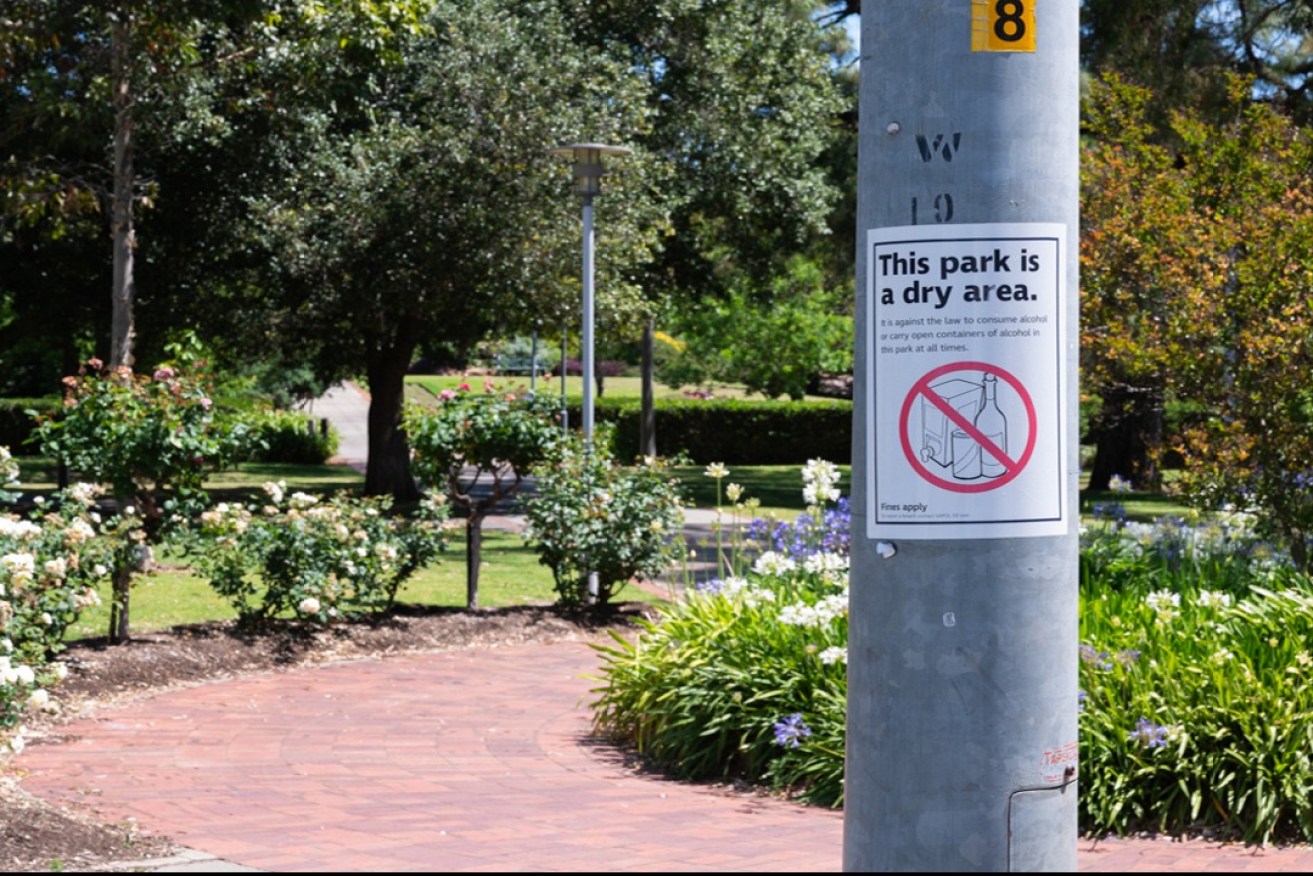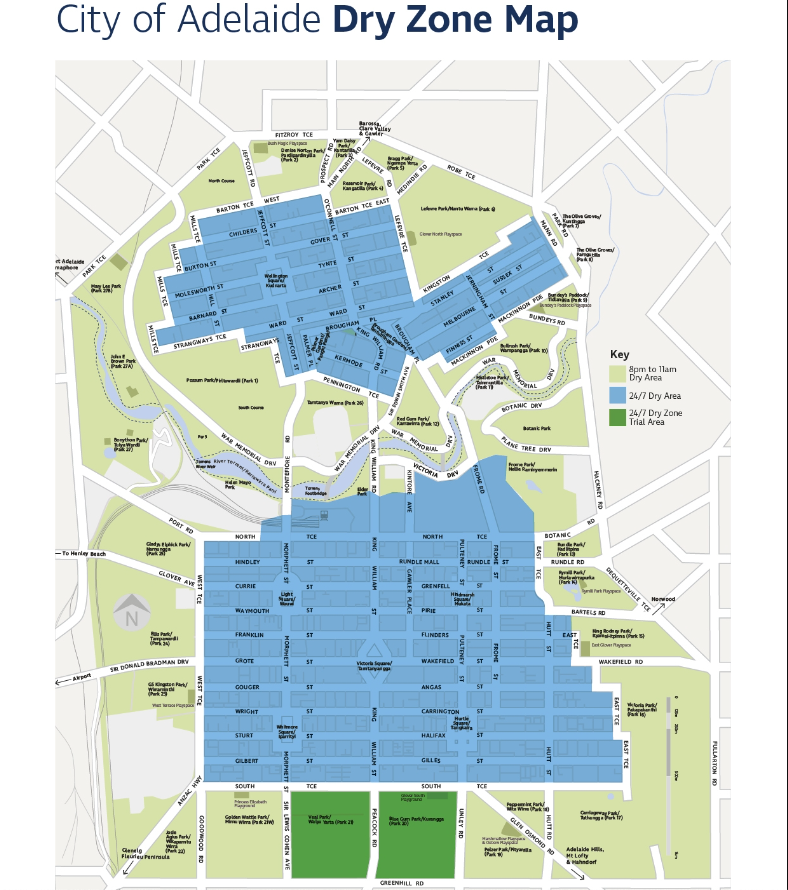Park lands dry zones under spotlight
A permanent, around-the-clock alcohol ban in two southern park lands could be wound back in 2025, after Adelaide City Council admitted there were “inadequacies” in monitoring the effectiveness of park lands dry zones.


Veale Gardens, Park 21 is a permanent dry zone. Photo: Liam Jenkins/InDaily
Since 2014, all Adelaide park lands have been dry zones from 8pm to 11am, seven days a week – except for Blue Gum Park/Kurangga (Park 20) and Veal Park/Walyu Yarta (Park 21).
These two southern park lands were made 24-hour dry zones in December 2019.

A map of dry zones across the park lands. The CBD and North Adelaide’s streets and squares have been permanent 24/7 dry areas since 2001. The two parks highlighted in dark green are also 24/7 dry areas. Image: City of Adelaide
The previous elected council asked the state government to approve the 24/7 dry zones after concerns from neighbouring residents and business owners that the city’s south had become prone to problem drinking and disruptive behaviour.
The state government has since extended the dry zone on three occasions following requests from council. The regulations are again due to expire on December 22.
The council administration this week asked councillors for the authority to request a four-year extension of the overall dry zone until December 22, 2027.
But councillors resolved at a committee meeting on Tuesday night to only ask for an extension until June 22, 2025, saying they were concerned about the lack of data on the effectiveness of the alcohol bans.
Councillors also agreed to ask the state government to conduct a 12-month “monitoring and evaluation process” of the dry zones and present council with “proposals for alternative measures to our communities”.
The recommendation still needs to be adopted at next week’s council meeting.
It comes after the council administration conceded there are “inadequacies” in how the dry zones are being monitored.
“Since the introduction of the Adelaide Park Lands Dry Area Regulation, there has been no comprehensive evaluation of the effectiveness and impacts of the Dry Area Regulation,” the administration said in its agenda papers.
“The application of regulations to the consumption of alcohol in public spaces disproportionately disadvantages people experiencing homelessness and other vulnerable people who use public space to conduct their daily activities.
“The implementation of a dry area has always required coordinated and multifaceted supports for vulnerable people who often have complex needs.”
The administration said that first responder organisations, including SA Police and the SA Ambulance Service, have “generally supported extension of the Adelaide Park Land Dry Area Regulation with some provision of data to demonstrate need and effectiveness”.
However, the administration added that consultation on the dry area extension revealed “there is no consensus in the community or by stakeholders on the continuation of the… Dry Area Regulation”.
“The review process has highlighted inadequacies in the data as currently collected to categorically determine the impact of the Dry Area Regulation and therefore a future evaluation tailored to the Dry Areas is required,” the paper states.
The SA Ambulance Service (SAAS) submitted to the council consultation that the number of drug and alcohol related incidents in Park 20 and 21 declined in 2022 compared to 2021.
However, the agency said this may have been due to the establishment of a COVID camp in Park in 2021.
“The South Australian Ambulance Service agrees with the extension for at least a 2-year period stipulating that this should enable ‘cleaner’ data capture following the COVID pandemic restrictions,” council’s summary of SAAS’s submission said.
South Ward councillor Keiran Snape attempted to change the 24/7 dry zone in parks 20 and 21 to align with the 8pm to 11am ban in other parks.
The Greens councillor, who said “I just don’t think there’s science to having it different from the rest of the park lands”, did not receive widespread support for his proposed amendment.
Central Ward councillor David Elliott, a member of council’s Reconciliation Committee, said “this hasn’t been a data informed policy from the start”.
He also said there was “a really deep sense from almost all the members of the Reconciliation Committee that this is a very targeted and a very race-based policy that has unequal outcomes and unhelpful outcomes for Aboriginal people”.
“To continue it on the basis of a lack of data is not a sound decision as much as maybe it’s not a sound decision to remove it on the basis of no data,” he said.
“So there really is no black or white response in this… because there was still no data to start with, and it’s been going on for years with no data.”
Deputy Lord Mayor Phillip Martin introduced the amendment calling for a six-month review of the dry zones. This was later extended to 12 months after Lord Mayor Jane Lomax-Smith suggested six months was not enough to collect sufficient data.
Martin said he was concerned that “there’s absolutely no data to support that this is an effective way in which to deal with anti-social problems in the park lands”.
“I find myself conflicted because I actually do fear that it is discriminatory – I hear that from service providers and groups working with the homeless,” he said.
“And yet I understand that the solution is not the punitive ban that is being described here tonight, it’s actually finding the services to replace that to support those individuals.
“It is about finding the services that will support them in the absence of this ban.”
SA Police submitted to the council consultation that it supported extending the dry areas for a further two years.
It also provided confidential data on the dry zone regulations to the council.
“SAPOL are concerned that removing the Adelaide Park Lands Dry Areas would have a detrimental impact on community safety,” council’s summary of SA Police’s submission states.
“Enforcement of the Dry Area provisions allow SAPOL to address alcohol- related problems through enforcement of alcohol possession and consumption prohibition.”
The Department of Human Services also supported extending the dry zone, while Sister Janet Mead’s Adelaide Day Centre for Homeless Persons (Adelaide Day Centre) and Shelter SA did not.




